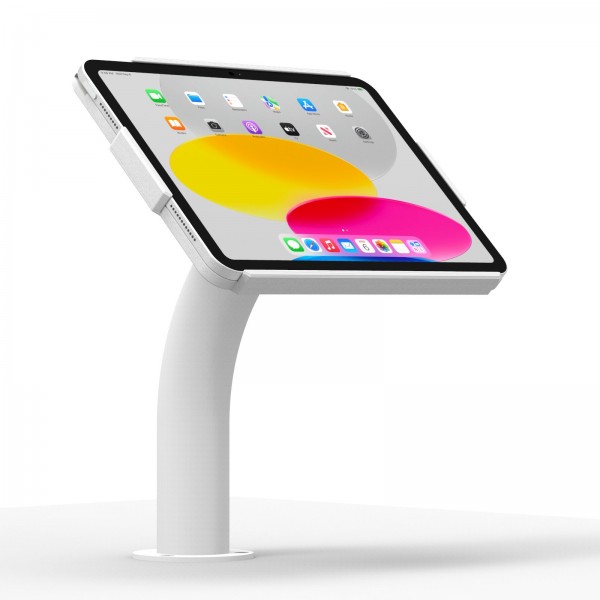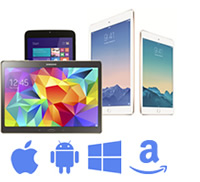Optimize Operations and Security with iPad Kiosk Solutions
April 10, 2025 - by Kerry B
Check-in kiosks are transforming industries by boosting operational efficiency and strengthening security. These versatile devices seamlessly merge hardware and software, streamlining processes, elevating visitor management, and protecting sensitive information.
Organizations that embrace iPad kiosks experience faster service delivery, enhanced data protection, and more satisfied users.
Unlock the potential of check-in kiosks to drive innovation, improve productivity, and fuel business growth.
This setup is particularly useful in environments such as retail, hospitality, and education, where the device needs to serve a specific function without distractions or unauthorized access to other apps and settings.
The primary functionalities of iPad kiosk include:
The iPad must be in Supervised Mode to enable this mode, which can be set up using Apple Configurator or a Mobile Device Management (MDM) solution.
This feature is easily accessible through the Accessibility settings on the iPad. For added customization, users can toggle Guided Access on and off quickly with a simple triple-click of the Home or Side button.
Choosing the right tablet stand is vital to maximizing the effectiveness of these setups. Look for secure, durable designs with customizable angles and hidden cable management to maintain a professional and organized appearance.
These smart choices help ensure smooth operations while reducing wait times, minimizing paperwork, and enhancing data accuracy.
Companies use Apple iPad kiosks in their stores to enable customers to explore products through virtual try-ons and personalized recommendations, creating an engaging shopping experience.
Streamlining the process by enabling guests to check in, choose their rooms, and print flight boarding passes.
Implementing robust security measures protects the device and the data it processes while ensuring a seamless user experience.
For example, businesses can use Mobile Device Management (MDM) solutions to enforce these restrictions effectively. MDM simplifies management by enabling automatic setup, empowering users with self-service options, and reinforcing security measures.
Implementing web filtering empowers organizations to safeguard their networks against phishing attacks and a wide range of online threats, ensuring robust cybersecurity defenses.
Enhancing security for check-in kiosks involves a multi-faceted approach that includes app restrictions, web filtering, encryption, remote wipe capabilities, and physical security measures.
Implementing check-in kiosks in business operations can enhance efficiency by streamlining processes, reducing wait times, and minimizing staffing needs.
These check-in kiosks improve customer experiences and provide valuable data management capabilities that help businesses make informed decisions.





The future of kiosk technology is bright, with numerous advancements on the horizon that promise to enhance user experiences, improve operational efficiency, and bolster security measures.
This trend has been accelerated by the global demand for contactless solutions, which stems from health concerns from the pandemic.
For instance, in retail settings, kiosks could suggest products based on previous purchases or browsing history, enhancing customer satisfaction and engagement. Additionally, AI can help streamline operations by managing inventory and providing real-time updates on product availability.
Future advancements may include biometric authentication methods such as facial recognition or iris scans to ensure secure kiosk access. Enhanced encryption protocols will protect data during transactions, addressing growing concerns about data breaches and privacy.
Furthermore, remote monitoring capabilities allow businesses to oversee kiosk performance and security remotely.
For example, kiosks equipped with AR can allow customers to visualize products in their environments before making a purchase decision, particularly in retail sectors such as furniture and home decor.
This interactive element enhances user engagement and aids in informed decision-making.
This connectivity allows businesses to gather valuable insights into customer interactions and kiosk performance, leading to continuous improvements in service delivery.
Industries such as healthcare, retail, and hospitality are leveraging check-in kiosks for faster check-ins, interactive displays, and cost-effective self-service experiences.
Stay future-ready with technologies like AI-driven personalization and AR integration. Unlock the full potential of iPad kiosks with VidaBox solutions.
Check-in kiosks are transforming industries by boosting operational efficiency and strengthening security. These versatile devices seamlessly merge hardware and software, streamlining processes, elevating visitor management, and protecting sensitive information.
Organizations that embrace iPad kiosks experience faster service delivery, enhanced data protection, and more satisfied users.
Unlock the potential of check-in kiosks to drive innovation, improve productivity, and fuel business growth.
How iPad Kiosks Work
iPad Kiosk Mode is a feature that allows users to lock an Apple iPad and iPad Pro into a single application, effectively transforming it into a dedicated kiosk.This setup is particularly useful in environments such as retail, hospitality, and education, where the device needs to serve a specific function without distractions or unauthorized access to other apps and settings.
The primary functionalities of iPad kiosk include:
Single App Mode
This mode restricts the iPad from running only one single app. It is ideal for businesses that require the device to perform a specific task, such as customer check-ins or displaying digital signage.The iPad must be in Supervised Mode to enable this mode, which can be set up using Apple Configurator or a Mobile Device Management (MDM) solution.
Enable Guided Access
Enabling Guided Access is an alternative to Single App Mode. It allows users to lock the device into one app while still providing some flexibility. Users can disable hardware buttons, restrict touch input, and set time limits for app usage.This feature is easily accessible through the Accessibility settings on the iPad. For added customization, users can toggle Guided Access on and off quickly with a simple triple-click of the Home or Side button.
Top Tablet Mounts for Secure and Versatile Display Solutions

VidaMount Open Flexible iPad / Tablet Desk / Surface Mount
|

VidaMount Open Fixed Surface Lite iPad / Tablet Mount
|

VidaMount Open Fixed iPad / Tablet Desk / Surface Mount
|
| GET THE DETAILS | GET THE DETAILS | GET THE DETAILS |
Stay Focused, Secure, and in Control With iPad Kiosk
User Focus
Kiosk Mode enhances user focus and interaction by restricting access to only one app. This is particularly beneficial in environments where distractions can lead to confusion or errors.Customization Options
Businesses can customize their kiosk experience by configuring settings such as disabling volume controls and other hardware buttons. This ensures that users remain engaged with the intended application without interruptions.Remote Management
Administrators can remotely manage devices in Kiosk Mode for organizations using MDM solutions. This includes pushing updates, monitoring usage, and enforcing compliance with security policies across multiple devices simultaneously.Eco-Friendly Impact: Check-in kiosks reduce paper waste and promote business sustainability by replacing paper forms with digital check-ins.
Creative Uses of iPad Kiosks Across Industries
iPad check-in kiosks have become versatile tools across various sectors, providing innovative solutions that enhance customer engagement and streamline operations.Healthcare: Patient Check-Ins
Check-in kiosks streamline the patient check-in process in healthcare settings by enabling quick registration, form filling, and personal information updates without staff assistance.Choosing the right tablet stand is vital to maximizing the effectiveness of these setups. Look for secure, durable designs with customizable angles and hidden cable management to maintain a professional and organized appearance.
These smart choices help ensure smooth operations while reducing wait times, minimizing paperwork, and enhancing data accuracy.
Retail: Interactive Product Displays
Retailers utilize iPad kiosks as interactive product displays, allowing customers to browse catalogs, view product details, and even place orders directly from the kiosk.Companies use Apple iPad kiosks in their stores to enable customers to explore products through virtual try-ons and personalized recommendations, creating an engaging shopping experience.
Museums: Informational Exhibits
Museums are leveraging iPad kiosks to provide interactive educational content and allow visitors to access multimedia information about artifacts and exhibits through touchscreens. This enhances visitor engagement and provides a more immersive learning experience.Hospitality: Self-Service Check-Ins
In the hospitality industry, hotels are adopting Apple iPad kiosks for self-service check-ins. This approach simplifies the check-in process by allowing guests to bypass long lines at the front desk and check in quickly using a user-friendly interface.Streamlining the process by enabling guests to check in, choose their rooms, and print flight boarding passes.
Enhancing Security with iPad Kiosks
As iPads are increasingly deployed in public spaces as kiosks, ensuring their security is paramount. These devices often handle sensitive information, making them potential targets for unauthorized access or data breaches.Implementing robust security measures protects the device and the data it processes while ensuring a seamless user experience.
App Restrictions
iPad kiosks allow organizations to lock the iPad to a single or predefined set of applications. This restriction minimizes the risk of unauthorized access to sensitive data and prevents users from tampering with device settings or installing unapproved apps.For example, businesses can use Mobile Device Management (MDM) solutions to enforce these restrictions effectively. MDM simplifies management by enabling automatic setup, empowering users with self-service options, and reinforcing security measures.
Web Filtering
iPad kiosks can be configured to limit web browsing capabilities, allowing access only to approved websites. This feature is vital in environments where users might inadvertently visit harmful sites.Implementing web filtering empowers organizations to safeguard their networks against phishing attacks and a wide range of online threats, ensuring robust cybersecurity defenses.
Encryption
Data encryption is essential for safeguarding sensitive information stored on the device. MDM solutions often provide options to enforce encryption on iPads, ensuring that even if a device is lost or stolen, the data remains secure and inaccessible without proper authorization.Remote Wipe Capabilities
In the event of theft or loss, remote wipe capabilities allow administrators to erase all data on the iPad remotely. This feature is vital for protecting sensitive information and compliance with data protection regulations. It ensures that any confidential data does not fall into the wrong hands.Physical Security Measures
Beyond software-based security, physical security measures such as lockable enclosures and secure mounts are essential for preventing theft or tampering. A dedicated kiosk enclosure protects the iPad from physical damage and deters unauthorized access in high-traffic or unattended areas. These measures help ensure the iPad remains in its designated location and is protected from physical damage.Enhancing security for check-in kiosks involves a multi-faceted approach that includes app restrictions, web filtering, encryption, remote wipe capabilities, and physical security measures.
Test Offline Capabilities: If your kiosk app is operating in areas with unreliable internet, ensure it supports offline functionality and can still perform essential tasks such as data collection.
Boosting Operational Efficiency in Businesses Using iPad Kiosks
Implementing check-in kiosks in business operations can enhance efficiency by streamlining processes, reducing wait times, and minimizing staffing needs.
These check-in kiosks improve customer experiences and provide valuable data management capabilities that help businesses make informed decisions.
Operational Advantage
How It Works
Impact on Business
Reduced Wait Times
iPad kiosks enable self-service check-ins and order placements, significantly decreasing transaction times
Increases customer satisfaction and loyalty by providing quicker service, particularly during peak hours
Minimized Staffing Needs
Automating routine tasks allows businesses to operate with fewer staff members
Frees up employees to focus on complex tasks, enhancing overall service quality and efficiency
Enhanced Data Management
Kiosks collect and analyze customer data, tracking interactions and preferences effectively
Provides valuable insights for optimizing staffing levels and improving service offerings based on behavior
Streamlined Operations
Integration of kiosks into workflows speeds up processes such as check-ins and order placements
Reduces errors associated with manual entries, leading to cost savings and better resource allocation
Cost-Effective Solutions
Long-term savings from reduced staffing needs often outweigh initial investment costs
Lowers operational expenses and allows for quick adaptation to market changes through easy software updates
Future Trends in Kiosk Technology
As technology continues to evolve, the future of kiosk technology, particularly check-in kiosks, is set to undergo significant advancements.The future of kiosk technology is bright, with numerous advancements on the horizon that promise to enhance user experiences, improve operational efficiency, and bolster security measures.
Enhanced User Interfaces
Future kiosks will feature more intuitive and engaging user interfaces that leverage touchless technology. With advancements in voice recognition and gesture control, users can interact with kiosks without physical contact, making them more hygienic and accessible.This trend has been accelerated by the global demand for contactless solutions, which stems from health concerns from the pandemic.
Integration with Artificial Intelligence
Incorporating AI into kiosk technology will revolutionize user experiences by providing personalized interactions. AI-powered kiosks can analyze customer preferences and behavior to offer tailored recommendations and services.For instance, in retail settings, kiosks could suggest products based on previous purchases or browsing history, enhancing customer satisfaction and engagement. Additionally, AI can help streamline operations by managing inventory and providing real-time updates on product availability.
Improvements in Security Features
As kiosks handle increasingly sensitive data, robust security measures will become essential.Future advancements may include biometric authentication methods such as facial recognition or iris scans to ensure secure kiosk access. Enhanced encryption protocols will protect data during transactions, addressing growing concerns about data breaches and privacy.
Furthermore, remote monitoring capabilities allow businesses to oversee kiosk performance and security remotely.
Augmented Reality (AR) Integration
AR technology is poised to transform how users interact with kiosks by providing immersive experiences.For example, kiosks equipped with AR can allow customers to visualize products in their environments before making a purchase decision, particularly in retail sectors such as furniture and home decor.
This interactive element enhances user engagement and aids in informed decision-making.
Internet of Things (IoT) Connectivity
Integrating IoT technology into kiosks will enable real-time data sharing and analytics. IoT-enabled kiosks can connect with other systems for better inventory management and predictive maintenance, ensuring they are always operational.This connectivity allows businesses to gather valuable insights into customer interactions and kiosk performance, leading to continuous improvements in service delivery.
Transform Operations with iPad Kiosks
Check-in kiosks are revolutionizing business operations by enhancing visitor management, boosting customer engagement, and safeguarding data. With features such as Single App Mode, Guided Access, and remote management, these kiosks streamline workflows and provide robust security.Industries such as healthcare, retail, and hospitality are leveraging check-in kiosks for faster check-ins, interactive displays, and cost-effective self-service experiences.
Stay future-ready with technologies like AI-driven personalization and AR integration. Unlock the full potential of iPad kiosks with VidaBox solutions.























